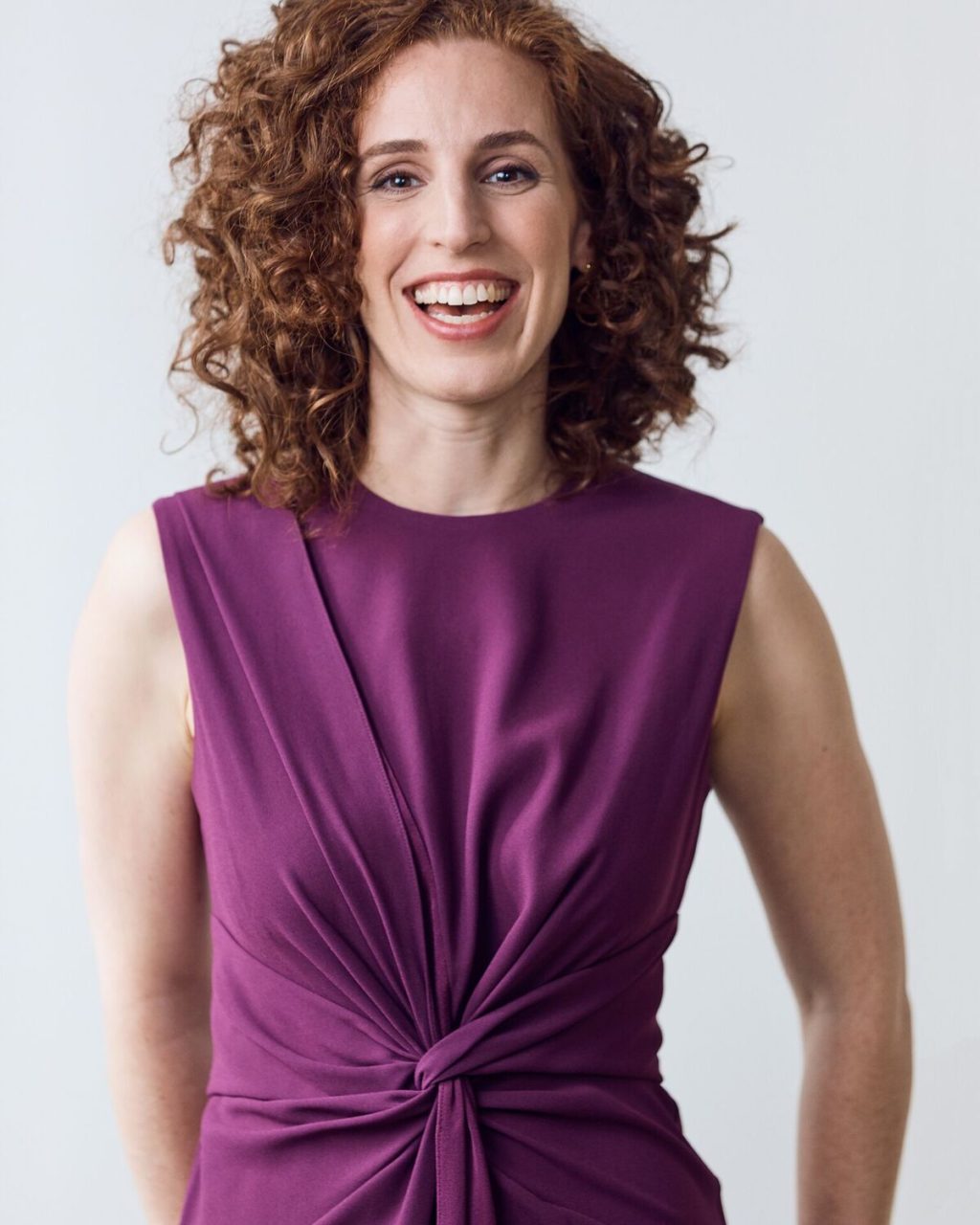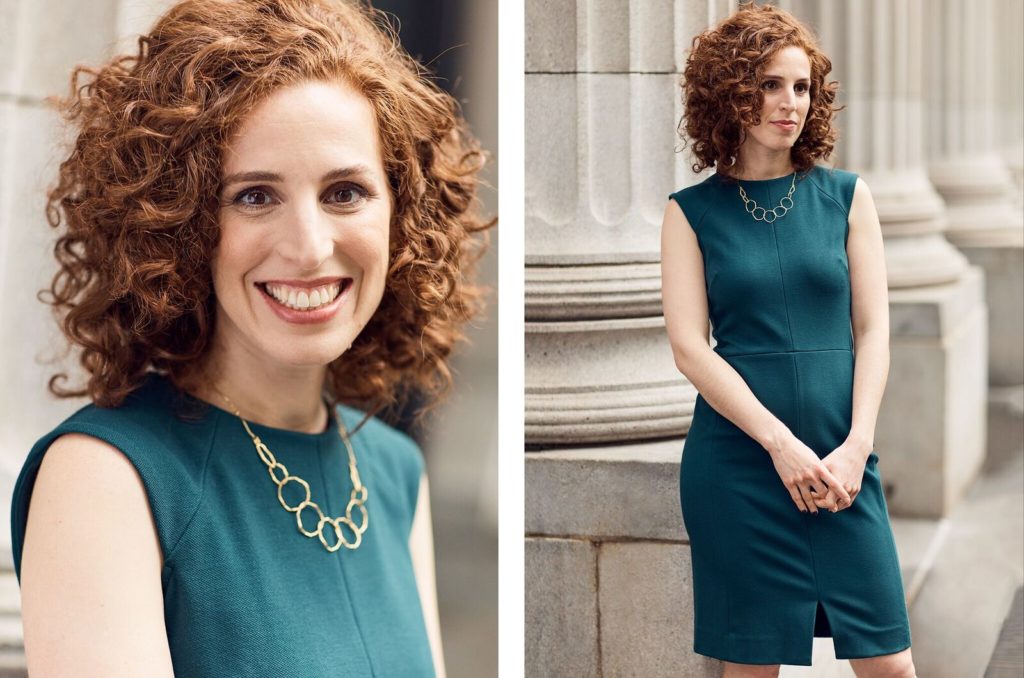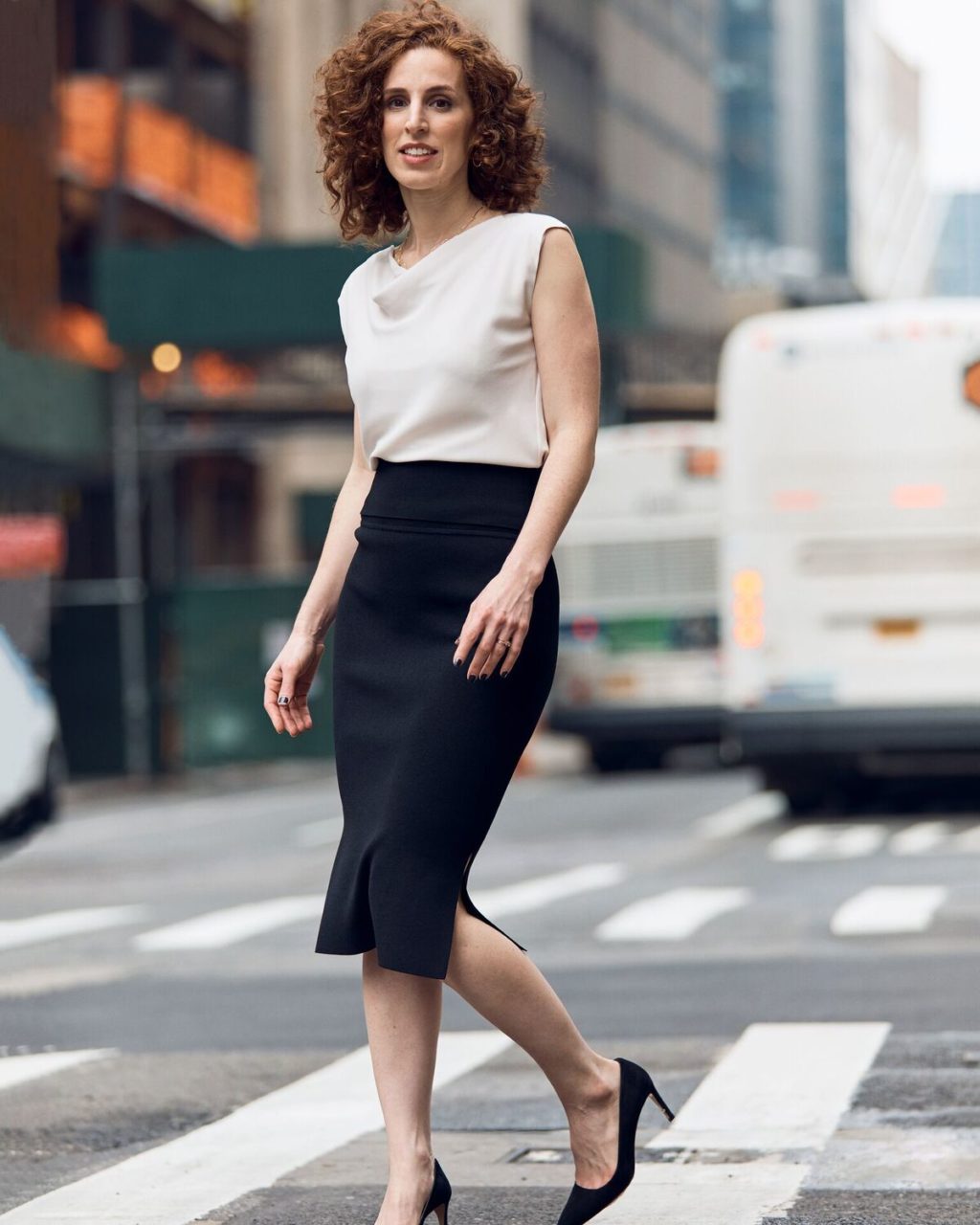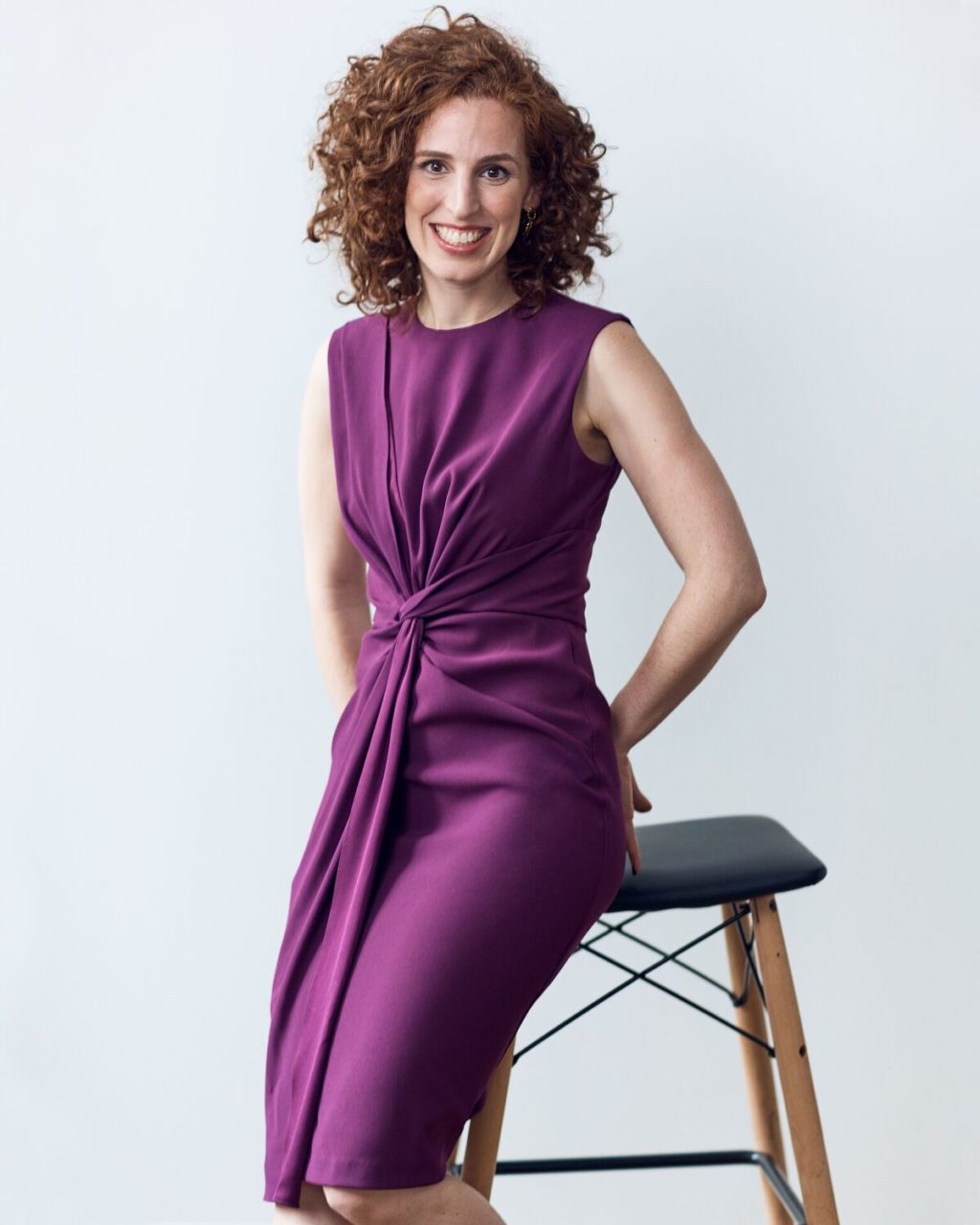Chalkbeat CEO Elizabeth Green Knows a Good Story When She Sees It
July 20, 2018 | Filed in: Woman of the Week
As a young reporter covering public education, Elizabeth Green was frustrated by the limited space her stories got in the newspaper each day. So she started publishing longer, more detailed pieces on a separate website, which eventually became GothamSchools, an outlet focused entirely on New York’s education system. That website later evolved into Chalkbeat, a nonprofit news organization that covers efforts to improve public schools across the country. As Chalkbeat’s CEO and editor-in-chief, Green wears many hats on a daily basis; here, she talks about striking out on her own, creating a humane workplace, and the high school student who inspired her career.

Elizabeth wears the Taylor dress in deep plum.
I WANTED TO BE A JOURNALIST from age 16 onward, and I wanted to cover education—but before that, I thought I would be a poet or a novelist. I signed up for my high school newspaper, because it seemed like the practical thing for an aspiring poet or novelist to do. One day, I was doing this assignment about “hallway behavior.” You know, a typical high school newspaper topic: “Is it okay to have PDA in the hall?” I interviewed a bunch of different people in the cafeteria during lunchtime, and one of them was this girl who I’ll never forget—I remember her name and everything. She totally changed my life. I was interviewing her, and she started talking about how everyone assumed that she’d drop out of school and become a welfare mom. She said, “That’s what people expect of me, and I work hard because I want to prove them wrong.” I said, “Who do you want to prove wrong?” And she looked me right in the eye and said, “You.”
IN THAT MOMENT, A LOT OF THINGS HAPPENED FOR ME. I started thinking differently about my school, which was very diverse. I’m white, and I was in the minority. My parents had both gone to college, and everyone assumed I would go to college. And here I was sitting down with this student, who was the same age as me, from the same town—Silver Spring, Maryland—with very similar goals and dreams. But the opportunities available to us to pursue those dreams looked completely different, because she was Hispanic and her parents hadn’t gone to college.
I CHANGED THAT STORY TOPIC from “hallway behavior” to Hispanic youth in my high school, and that was the first of several stories I wrote for the student newspaper about academic inequality. It felt so powerful to lift up that student’s voice—so that I wasn’t the only one who heard it, so that I wasn’t the only one who experienced that moment of reckoning and confrontation, and so that we could have a difficult conversation as a community. I saw the power of writing stories like that one, and I’ve wanted to keep doing that ever since. I also realized that my craft was not poetry, but journalism. Which is good, because I sucked as a poet anyway.

Elizabeth wears the Katie dress in rainforest and the Helene necklace.
WHEN I ENTERED THE WORKFORCE in 2006, I saw that the business model for a lot of news outlets was starting to crumble. My first job was at US News & World Report. As an intern, I was put on the K-12 education beat, which was exactly where I wanted to be. Unfortunately, there was no one else on that beat except me, the intern. That was the beginning of thinking that something needed to change. After that, I worked at a great newspaper in New York City called The New York Sun, doing beat reporting on public schools, which I loved. While I was there, I started a WordPress blog to publish more in-depth stories, because the newspaper could only fit about 700 words a day in my section. Then, unfortunately, that newspaper folded in October 2008, just as the economy was crashing.
LOSING MY JOB WAS OBVIOUSLY DIFFICULT. But at the same time, there was something about it that emboldened me. I was able to step back and think about what I really wanted to accomplish in the long term. I had meetings and job offers with other newspapers, but ultimately I decided to shop around the website I’d started to people who might want to support it. Everyone, especially my former colleagues, thought I was crazy to walk away from offers at established publications to work on this thing that no one had ever heard of. But to me, there wasn’t great job security anywhere; it seemed just as safe to strike out on my own as it would be to take a full-time job where I could be laid off at any minute. Also, I couldn’t see a newspaper wanting to support the kind of coverage that I cared about, because it wasn’t particularly commercially viable.
THE FIRST TIME I WALKED INTO A ROOM AND SAID, “Hi, I’m here as a reporter with GothamSchools”—which is what it was called then—I was terrified. I thought, Nobody knows what this is, and I sound crazy. I felt a lump in my throat as I said it. But nobody batted an eye. Even today, my husband and I have a debate about how I should introduce myself in professional settings. I maintain that people are somewhat put off by a young woman saying, “I’m a CEO,” while he thinks it’s the coolest thing ever and that I should own it. I always introduce myself as a journalist first, because that’s my core identity. I’m a CEO because I want to stand up for journalism, truth-telling, and starting necessary conversations. After that, I might also say that I lead a news organization.

Elizabeth wears the Rowling top in birch, the Harlem skirt in black, and the Helene necklace.
WOMEN ARE JUDGED ALL THE TIME BY HOW WE LOOK, and we just have to live with it. To feel confident and also not to have to think about what you’re wearing is huge. As a journalist, I want to look creative and casual and approachable, but also put together. It’s extra complicated for me, because I have so many different roles. I’m a boss and a mentor. I’m also a mentee, and a grantee. I have to be prepared for people to be surprised when I hand them my business card and it says “CEO,” although I’m working on making that moment a little less uncomfortable for all of us. Being comfortable in my own skin is important, and I’ve learned that if I’m comfortable, other people are more likely to be comfortable around me.
SOME OF THE THINGS I LOVE ABOUT BEING A REPORTER are the same things I love about being a leader. For example, I have a lot of ideas. I could come up with story ideas forever, and I also love to come up with ideas for where the organization is headed. It works the same muscles. However, I also like to have help with the execution side of things—I like to have deadlines, and editors to help with details. I’ve found it incredibly helpful to work with people who have expertise outside of news and magazines and who know what it looks like to build a healthy organization. It’s been very important to surround myself with people who know about management, operations, and organizational design, not just journalism.
AN UPSIDE TO THIS MOMENT IN TIME, when the old business models for media are changing, is that we can redesign news organizations to be more humane. They can become toxic and it’s easy for people to burn out. Everyone at Chalkbeat works really, really hard, and we’re always trying to think about how to improve everyone’s quality of life. One thing that’s been helpful is that we turn off on the weekends. As a mission-driven non-profit, we can make decisions that aren’t about chasing ad dollars. We’re defining our goals based on impact rather than letting advertisers grind us into oblivion. It’s important to us that our staff has time and space for their lives and their definition of family.

Elizabeth wears the Taylor dress in deep plum.
TODAY, CHALKBEAT IS IN SUCH A DIFFERENT PLACE than we were when we started. We are about to close our fiscal year with a $5 million operating budget and quite a healthy amount of cash in the bank. Our team is now about 40 people. We have a 30-person newsroom, and 10 people in non-editorial jobs. Personally, I love every piece of what we’re doing. I love looking at our budget and thinking about how it should be structured. Even though I’m not an expert, it’s fun for me. I love figuring out our revenue strategy. I see the revenue side of the business as equally sacred and important as the journalism itself, because you can’t do one without the other.
I’VE DEFINITELY HAD MOMENTS WHEN I FEARED for the future of Chalkbeat. I used to fall asleep and wake up doing math problems: “How the hell are we going to pay for this for another month, two months, three months?” And “What’s the next check that’s going to come in the door to make this thing possible?” Sometimes when those numbers didn’t add up, I was tempted to throw up my hands. But I learned that I could do it, especially with the right team. And all of the people who gave us one check and said, “I believe in this, and I’m here with you”—they kept us going, literally and figuratively. It became a social movement. All it takes is one and then another person saying, “I refuse to give up on this project.”
Photographs by Jeff Allen.





